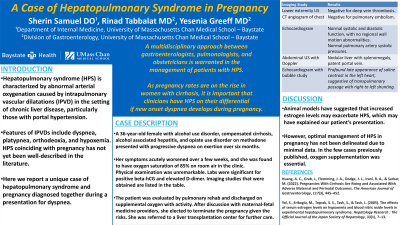Monday Poster Session
Category: Liver
P2515 - A Case of Hepatopulmonary Syndrome in Pregnancy
Monday, October 23, 2023
10:30 AM - 4:15 PM PT
Location: Exhibit Hall

Has Audio

Sherin Samuel, DO
University of Massachusetts Chan Medical School-Baystate
Springfield, MA
Presenting Author(s)
Sherin Samuel, DO, Rinad Tabbalat, MD, Yesenia Greeff, MD
University of Massachusetts Chan Medical School-Baystate, Springfield, MA
Introduction: Hepatopulmonary syndrome (HPS) is characterized by abnormal arterial oxygenation caused by intrapulmonary vascular dilatations (IVPD) in the setting of chronic liver disease, particularly those with portal hypertension. Features of IVPDs include dyspnea, platypnea, orthodeoxia, and hypoxemia. HPS coinciding with pregnancy has not yet been well-described in the literature. Here we report a unique case of hepatopulmonary syndrome and pregnancy diagnosed together during a presentation for dyspnea.
Case Description/Methods: A 36-year-old female with alcohol use disorder, compensated cirrhosis, alcohol associated hepatitis, and opiate use disorder on methadone presented with progressive dyspnea on exertion over six months. Her symptoms acutely worsened over a few weeks, and she was found to have oxygen saturation of 85% on room air in the clinic. Physical examination was unremarkable. Labs were significant for positive beta-hCG and elevated D-dimer. Lower extremity ultrasound (US) was negative for deep vein thrombosis and CT angiography of the chest was negative for pulmonary embolism. Echocardiogram showed normal systolic and diastolic function, with no regional wall motion abnormalities, and normal pulmonary artery systolic pressures. Abdominal US with doppler showed a nodular liver with splenomegaly, and patent portal vein. Bubble study revealed profound late appearance of saline contrast in the left heart, suggestive of transpulmonary passage with right to left shunting. The patient was evaluated by pulmonary rehab and discharged on supplemental oxygen with activity. After discussion with maternal-fetal medicine providers, she elected to terminate the pregnancy given the risks. She was referred to a liver transplantation center for further care.
Discussion: Animal models have suggested that increased estrogen levels may exacerbate HPS, which may have explained our patient’s presentation. However, optimal management of HPS in pregnancy has not been delineated due to minimal data. In the few cases previously published, oxygen supplementation was essential. A multidisciplinary approach between gastroenterologists, pulmonologists, and obstetricians is warranted in the management of these patients. As pregnancy rates are on the rise in women with cirrhosis, it is important that clinicians have HPS on their differential if new onset dyspnea develops.
Disclosures:
Sherin Samuel, DO, Rinad Tabbalat, MD, Yesenia Greeff, MD. P2515 - A Case of Hepatopulmonary Syndrome in Pregnancy, ACG 2023 Annual Scientific Meeting Abstracts. Vancouver, BC, Canada: American College of Gastroenterology.
University of Massachusetts Chan Medical School-Baystate, Springfield, MA
Introduction: Hepatopulmonary syndrome (HPS) is characterized by abnormal arterial oxygenation caused by intrapulmonary vascular dilatations (IVPD) in the setting of chronic liver disease, particularly those with portal hypertension. Features of IVPDs include dyspnea, platypnea, orthodeoxia, and hypoxemia. HPS coinciding with pregnancy has not yet been well-described in the literature. Here we report a unique case of hepatopulmonary syndrome and pregnancy diagnosed together during a presentation for dyspnea.
Case Description/Methods: A 36-year-old female with alcohol use disorder, compensated cirrhosis, alcohol associated hepatitis, and opiate use disorder on methadone presented with progressive dyspnea on exertion over six months. Her symptoms acutely worsened over a few weeks, and she was found to have oxygen saturation of 85% on room air in the clinic. Physical examination was unremarkable. Labs were significant for positive beta-hCG and elevated D-dimer. Lower extremity ultrasound (US) was negative for deep vein thrombosis and CT angiography of the chest was negative for pulmonary embolism. Echocardiogram showed normal systolic and diastolic function, with no regional wall motion abnormalities, and normal pulmonary artery systolic pressures. Abdominal US with doppler showed a nodular liver with splenomegaly, and patent portal vein. Bubble study revealed profound late appearance of saline contrast in the left heart, suggestive of transpulmonary passage with right to left shunting. The patient was evaluated by pulmonary rehab and discharged on supplemental oxygen with activity. After discussion with maternal-fetal medicine providers, she elected to terminate the pregnancy given the risks. She was referred to a liver transplantation center for further care.
Discussion: Animal models have suggested that increased estrogen levels may exacerbate HPS, which may have explained our patient’s presentation. However, optimal management of HPS in pregnancy has not been delineated due to minimal data. In the few cases previously published, oxygen supplementation was essential. A multidisciplinary approach between gastroenterologists, pulmonologists, and obstetricians is warranted in the management of these patients. As pregnancy rates are on the rise in women with cirrhosis, it is important that clinicians have HPS on their differential if new onset dyspnea develops.
Disclosures:
Sherin Samuel indicated no relevant financial relationships.
Rinad Tabbalat indicated no relevant financial relationships.
Yesenia Greeff indicated no relevant financial relationships.
Sherin Samuel, DO, Rinad Tabbalat, MD, Yesenia Greeff, MD. P2515 - A Case of Hepatopulmonary Syndrome in Pregnancy, ACG 2023 Annual Scientific Meeting Abstracts. Vancouver, BC, Canada: American College of Gastroenterology.
